Writers can make or break a TV show, and change up the vibe of a show from season to season. Outlander has had its share of writer turnover. We look at the impact of losing Ira Steven Behr after Season 2.
While my love for Outlander knows no bounds, I must admit something felt off in Season 3. Not to say that it was bad, or that it needed an overhaul — it just felt different.
For quite a long time, I placed responsibility for the changed dynamic on elements that were added to Season 3. Was it the new writers’ room? Ron taking less of an everyday role on the show? The banana-land story of Voyager? But then it hit me — the change was not the result of an added facet. The change was the result of a facet removed: Ira Steven Behr.
For those who don’t remember him, Ira Steven Behr served as a writer and executive producer for Outlander during its development and through Season 1, as well as Season 2. Behr’s writing credits on Outlander include the following episodes: “The Garrison Commander,” “By The Pricking Of My Thumbs”, “Wentworth Prison,” “To Ransom A Man’s Soul,” “Not In Scotland Anymore,” “Prestonpans” and “The Hail Mary.”
Starting his career in 1981, Ira wrote for the television series Jessica Novak, and continued all the way to present day with his most famous work coming on Star Trek: The Next Generation (where he met Outlander showrunner Ron D. Moore) and also his showrunning duties on Star Trek: Deep Space Nine.
Ira’s work on DS9 was largely under-appreciated during its run because it was so vastly different from the original vision of Gene Roddenbery, creator of Star Trek. Consequently, Trek fans were hesitant to accept the kinds of conflict, humor, drama and all-out war Ira and his writing staff (which included Ron Moore) wanted to explore. In fact, you could even argue it’s a distant cousin to Ron’s own triumphant series Battlestar Galactica. In the nearly 20 years since its final episode aired, however, the fan base for Star Trek has finally started to recognize the art, originality and incredible writing acumen behind DS9’s thematic and character work.
That writing acumen and character work is what brings me to Ira’s work on Outlander, which, in my estimation, is exquisite. He is responsible for some of the most memorable moments in the entirety of Outlander’s run so far. Whether it’s the “one act play” of “The Garrison Commander,” or that incredible scene with Dougal and Lieutenant Foster in “Prestonpans,” one always knew what they were getting with Ira’s work: professionally written, expertly crafted, inventive and textured words that could be translated easily to the screen.
Why am I so confident in saying this? Well, let’s do a little exercise in what I mean by “character work.”
Put either Black Jack Randall in “The Garrison Commander,” or even Dougal in “Prestonpans” in your mind’s eye.
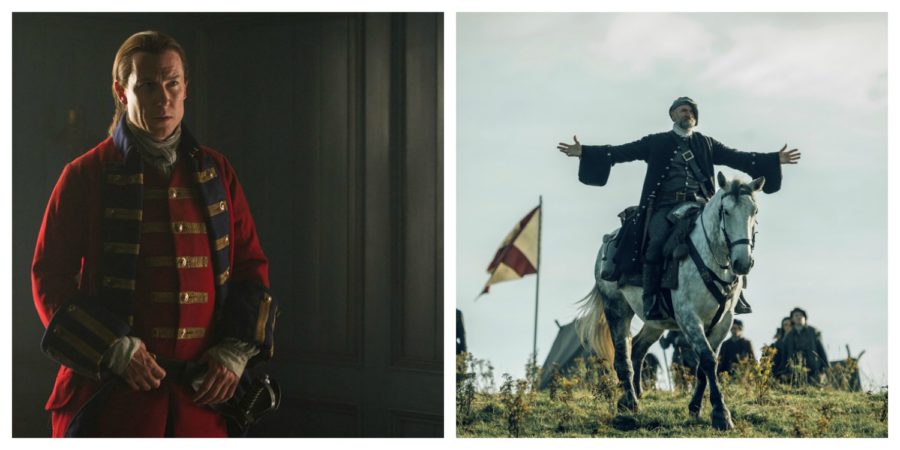
Now, pretend you’re having a conversation with someone who’s never seen Outlander, and describe BJR or Dougal (using examples from those episodes alone) WITHOUT saying what they look like, what they wore, what their profession is, or their role in the show.
While you come up with your own answers, I immediately think of BJR being cold and calculating by tricking Claire during their conversation. Impeccably trained and disciplined given his tutoring with his accent. Perhaps he’s slightly artistic because he draws her, and there’s a major disregard for the clean authority to which he must abide as he pours out the ever important Claret.
As for Dougal — well, he is menacing, in control and even a little wild as he charges down the hill before the battle of Prestonpans. He’s incredibly brave, if not prone to showmanship given his desire to test the marsh of the battlefield as he raised his arms to taunt the British. He’s ruthless, but also shares a bit of a soft side when he shares a heartfelt (if not conflicted) conversation before he plunges his knife into Lieutenant Foster.
These are all original ideas as proposed by Ira Steven Behr.
Of course there are PLENTY more examples I could rattle off, but the idea is that the more descriptive one can be while using the rules, the more detailed the character and the deeper understanding one could have of that character.
I know the immediate counter-argument is to say that Ron Moore is the showrunner and it’s his vision that has to be translated on screen. Moreover, other writers have contributed to the character work throughout Outlander. All true.
But the effect one screenwriter can have on a film, or even a television show, should neither be understated nor underestimated. While the Outlander world may be Ron Moore’s sandbox that is generally filled out by his staff of writers, it’s the small details each writer brings to the table, such as pouring out Claret, that defines the fabric of that world’s reality. Not only that, but it takes an unprecedented level of communication and understanding of vision to take a massive project like Outlander from vision, to paper, to film and, finally, to our screens.
I went back and listened to our podcast interview with Ira before writing this piece, and I was once again surprised at how close the two were on a professional level. As if he were Ron’s consigliere, Ira said that he and Ron had “an amazing short hand” and that at times, “it may have been too much so for some of the other writers” because there were “times when [he] had to veer in a way that the others [felt] like they did not.” The other writers were comprised of people who were huge fans of the book series, which Ira was not.
This fact is sneakily important. While he is the consummate professional writer who is extremely adept at creating real-life characters, I think his most beneficial trait is that, by his own account, he “was completely unaware of the Outlander phenomenon.” Since he didn’t have any loyalty to the book, Ira could hone his talent on making the best SHOW he possibly could.
This is doubly important when you think why he was asked to join the writers’ room. He joined Outlander simply because his friend Ron Moore, well aware of his talent, asked him. Sure, he had to read the book for background, but his job was to keep the room focused on adapting the beloved book into a captivating television series.
Another fascinating aspect of our podcast conversation was when we learned how much trust Ron put into Ira’s hands because, as Ira stated it, it was his job to “run the writers’ room in Ron’s absence.” Even if Ron were present, Ira still had to help smooth issues the other writers couldn’t handle. Ira says this of “The Garrison Commander”:
“I was originally going to write as my first script episode three, and episode six was broken by the staff. And I could tell and Ron could tell that there were some issues about the confidence in that script. I went to Ron and I told him, ‘Look if you want me to do it, I’ll switch episodes. I’ll do six,’ and he said, ‘Yes, yes, thank you. I know you’ll do it, and we’ll have a great script out of it.’”
Getting a great script for “The Garrison Commander” is EXACTLY what happened, and this is where I want to really dive deep into why Outlander misses Ira Behr.

Knowing there was very little description in the book except for the punch, Ira jumped into “The Garrison Commander” with the idea to create a descriptive one act play between Claire and BJR that made Black Jack a far more viable character than the book had ever imagined. Ira continued:
“And that’s when I really got into the character and started to come up with all of these little pieces that interested me… It was the small details: the pouring of the wine out the window, the line ‘the truth bears the weight that no lie can counterfeit.’ I mean there were things that I just discovered along the way that made it these little things that started to fascinate me and I realized just what a complicated…I never really thought about Black Jack much or that he was a complicated character, except for that he had a wicked dark side to him. But that wasn’t all that interesting at first for me but then as I went through it, and yes, then I became Black Jack.”
So let’s take a closer look at this one act play between BJR and Claire to see the exact impact Ira had on Outlander.
One of my favorite techniques that Ira uses is to make the whole point of the scene funnel down to the absolute last line of that scene. As John Truby states in his book, The Anatomy Of A Scene, “the beginning of the scene should frame what the whole scene is about. The scene then funnels down to a single point, with the most important word or line of dialogue stated last.” In other words, let’s think of it like an upside down triangle — starting off with a broad line that forms the framework of the scene, and it becomes more pointed as the scene goes along to allow the whole thrust of the scene to be pierced by one line.
Our first example of this tool would be right after we see the beating of Jaime via flashback and BJR discusses why he did what he did to him. The first line is:
BJR: The crowd had to look away. They were horrified. Blind fools. I think all they could see was the horror. I…I could see the beauty. I saw the truth. That boy and I…we were creating a masterpiece. An exquisite, bloody masterpiece. It’s the most beautiful thing I have ever seen.
And here is the real kicker:
BJR: But truth carries a weight that no lie can counterfeit.
(chills)
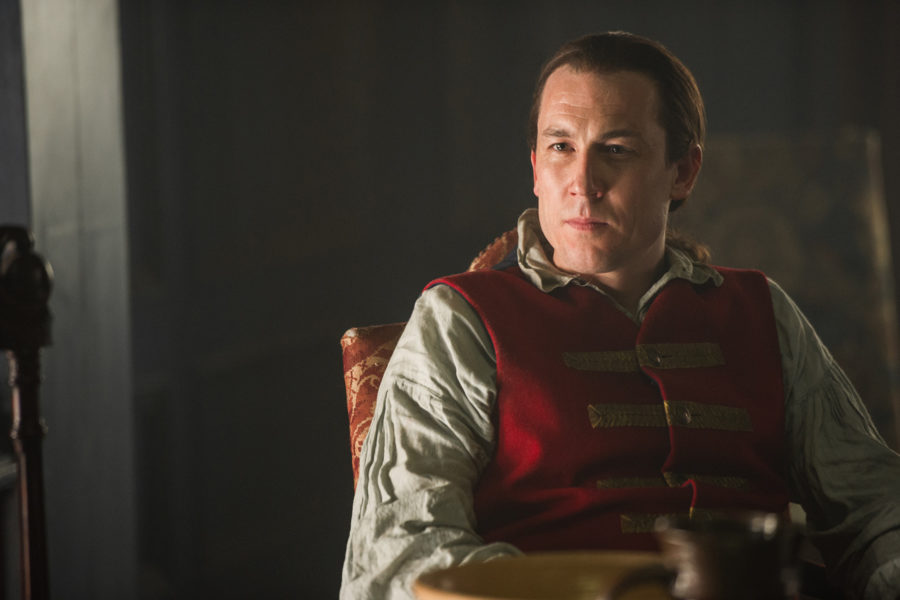
This immediately sets the tone — how much humanity is in Black Jack Randall? But more importantly, he knows that Claire is lying to him about her sad story of being lost in the woods. He is telling her right from the beginning.
So ultimately, this scene is about tricking Claire, uncovering what she knows, and that he will not give up until he sees the weight of her truth.
But like a well-written scene does, it continues to funnel down even further:
BJR: I promised that I would reveal myself to you. And I have.
Claire: Yes, I believe you have.
BJR: You think me a monster no doubt. It could be so.
Claire: The fact you care what I think gives me some hope yet for your soul.
This is where Claire becomes trapped in BJR’s game. She’s inching closer and closer with each breath, and every word that comes out of his mouth.
BJR: I know one thing, madame, I am not the man I once was. I came to Scotland to fulfill a soldier’s responsibility and to serve my king and protect my country. Instead, I find myself the watchmen of a squatly, ignorant people, prone to the basest superstition and violence. The darkness has grown within me. The hatred of the very world itself. I find myself doing such things — garish work — until I no longer recognize the man I’ve become.
Claire pauses, tears welling at the bottom of her eyelids. She falls deeper:
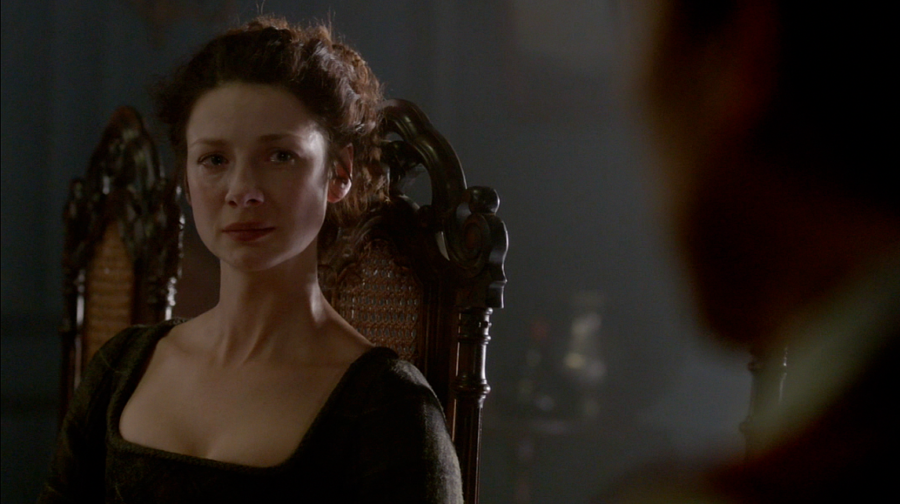
Claire: You are not the first soldier to be changed by combat. The fact that you can admit to it is yet another hopeful sign.
Now he has her.
BJR: Of what?
Claire: You say that buried within you is a decent man. A man who can still choose right over wrong. I believe that part of you lives still.
BJR: It would be pretty to think so.
Claire: You cannot undo the things you have done, but it is not too late to bring back your humanity. You can choose to be the man you wish to be.
BJR: Do you think it possible that one day I may be able to gaze upon my reflection and not be filled with loathing?
From here the noose tightens around Claire’s throat, when she tells him that he is capable of anything, and he tangles her brain by pondering the rehabilitation of Black Jack Randall, and that he could begin this route by having Claire escorted to Inverness. Claire thinks she has gotten EXACTLY what she has come for.
She’s leaving.
Black jack has made her happy, and it’s an odd sensation. A new beginning.
Everything is perfect. Until finally we get to the whole point of this mental web BJR has spun to a perfect tee.
The scene comes to a head with the infamous punch to Claire’s stomach. Now she finally realizes how much trouble she really is in.
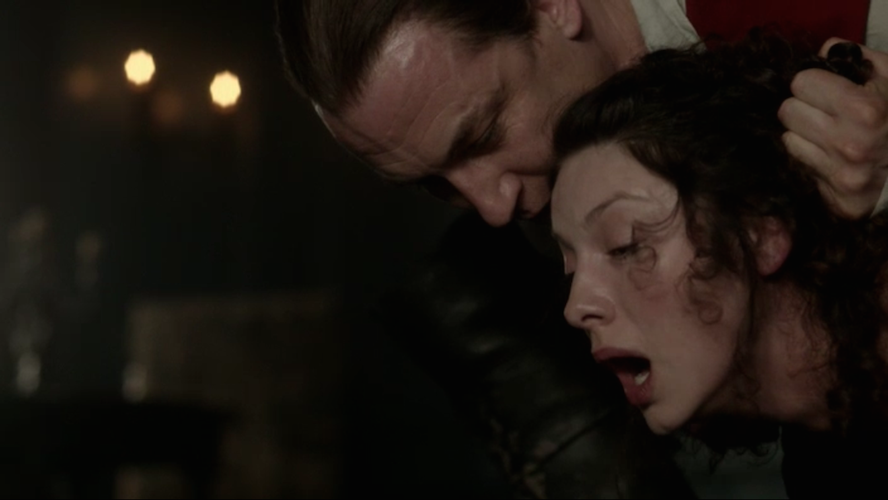
BJR: I dwell in darkness, madame, and darkness is where I belong. I need no sympathy from you and you will get none from me. One way or the other, I will get the truth out of you.
Corporal Hawkins comes by, gives her a good kick to the stomach at BJR’s insistence, Dougal bursts in for the rescue and Black Jack demands that he bring Claire back or else the will hunt them all down to death for harboring a fugitive of the King, regardless of title or where they are. Scary stuff.
But what is the final line?
BJR: I look forward to our next meeting, Mrs. Beauchamp.
END SCENE.
The truth is revealed about both our main characters and the plot of the story is forever, and irrevocably, changed.
As a result, we see the special relationship between BJR and Jamie, BJR’s depravity, Claire’s fragility, and undeserved confidence in her ability to navigate the 18th century. It sets up Claire to marry Jamie, BJR to discover Jamie’s whereabouts and, ultimately, puts our couple on the run, leading down the path to our next and inevitable meeting between them: Wentworth Prison.
Within the framework of a six-minute scene, the whole of the story to come, and the fine details that make our characters living and breathing creatures are completely laid out. And everything in that scene, except the punch, came directly from Ira Behr.
THIS is why Outlander misses Ira Steven Behr.
As evidenced by this scene, all his other works on Outlander and, especially, his time on Deep Space Nine, he’s simply an old school writer who understands what it takes to create an effective scene that makes the most out of the protagonist and antagonist characters — and all within a specific time frame.
Is Ira the only one capable of creating a scene like this? Of course not. But I don’t believe that level of writing has been matched by Outlander yet (except perhaps the confrontation between Claire and Frank in “The Battle Joined,” which, oddly enough, is written by none other than Ron Moore). Since, however, we are talking about antagonists, let’s put Season 3’s part-time antagonist to the same test we gave Ira for BJR. Can we see the same level of writing?
Using the parameters I set up earlier in this article, describe Geillis in “The Bakra.”
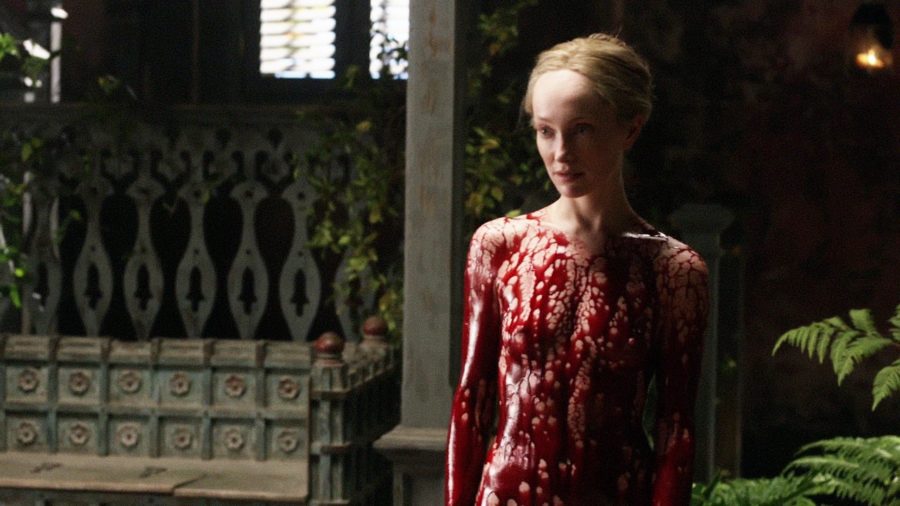
I LOVE THIS SCENE. It’s one of the most memorable visual cues from Outlander ever.
But, in terms of character, what are we actually looking at here?
The only thing I can come up with is that she likes bathing in blood? Wait, I can’t use that because that’s what she looks like. Hmm…she likes virgins? Okay…
Oh wait, yes, she’s obsessed with a prophecy that came out of nowhere in the final two episodes of the season. Nope, can’t use that because that’s her role in the show.
She’s…crazy? But what does that even mean? Why is she crazy? Why exactly is she wanting to kill Bree? Better yet, what the heck is the point behind her conflict with Claire again? I literally can’t think of anything to the same degree as BJR from “The Garrison Commander.”
In fact, I’d argue the best clue about her character didn’t come from the script – but, rather, the soundtrack! Bear McCreary’s use of the Yialli Tanbur to create an alien, metallic sounding perversion of the stones theme to be used as Geillis’ theme tells us volumes more about the kind of sick, crazed, and perverted character she is.
In other words, the proper stones theme represents all that is magical and wondrous about Outlander. When something otherworldly is happening on Outlander, it’s almost always accompanied by the Stones theme. It’s a sound we know, love and trust. But by twisting that theme with a sound never heard on Outlander before, it’s a sonic cue for the listener that what we are watching on screen is off, foreign, and completely opposite of what we love and/or trust. It’s the anti-Outlander. And if it’s the anti-Outlander, wouldn’t that make Geillis the anti-Claire? Cool, right?
Did we get ANY of that notion from the script? My gut rings with a resounding, “no.” I don’t know, maybe it’s just me but her characterization just feels thin.
I know Ron’s staff has many talented writers — paging Toni Graphia! But there’s just something special about a guy who just writes good television for the sake of it because it interests him. Not because he LOVED the books and is the biggest fan there is, but because he was challenged by making a viable character out of Black Jack Randall who otherwise would be nothing but a mustache-twirling villain as the book would have him be.
Between structure, using simple writing tools, understanding character and having enough of a relationship with the showrunner so that he can translate Ron’s words to paper and carry them out with the other writers, it’s my belief that Ira is missed mostly because he could be leaned on to fix writing issues that appear to be too complicated for others who may be too invested in what happened in the book series.
It’s one thing to make a word-for-word faithful adaption of Outlander. I’m sure many fans would be pleased with that. It’s even one thing to include all the bit points the books have to offer (see the back half of Outlander Season 3). But it’s another to create compelling television that’s inspired by the book, and that is why Outlander isn’t the same without Ira Steven Behr.
Do you agree that the show is missing something with the departure of Ira Steven Behr?
Who are your favorite Outlander writers?


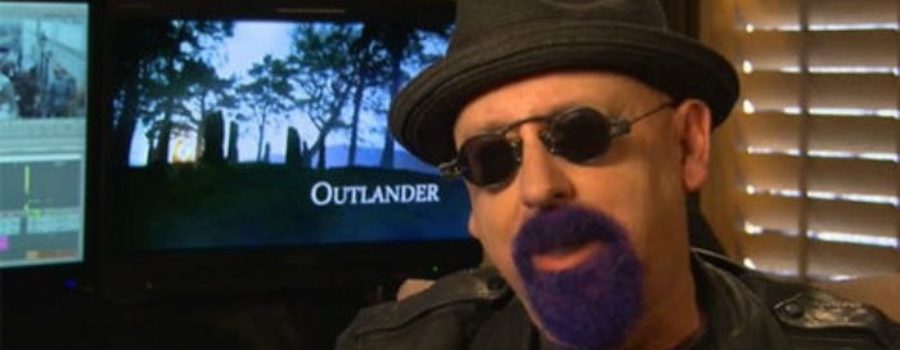



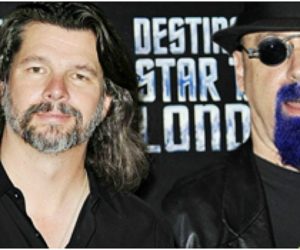
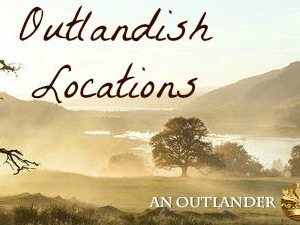

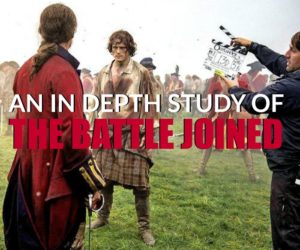





34 Comments
Leave your reply.